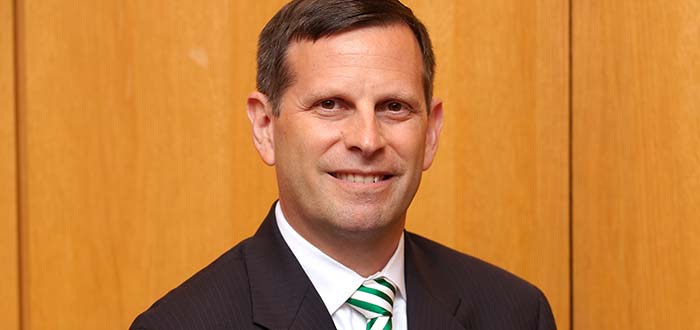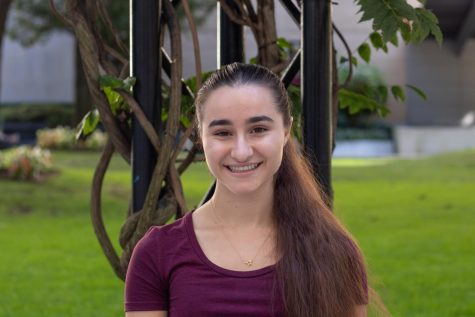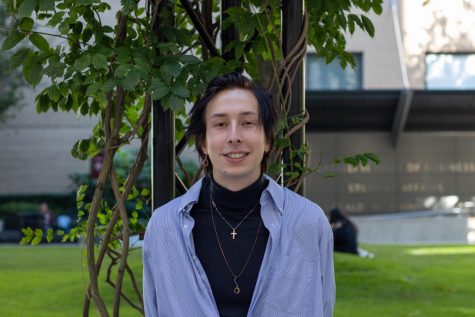Influential Law Professor on Privacy in the Digital Age Dies at 59
COURTESY OF FORDHAM LAW
Reidenberg taught cybersecurity and law for 30 years while also founding CLIP in 2005, running it for the remainder of his time at Fordham.
May 10, 2020
Joel Reidenberg, professor of law and the founding academic director of Fordham’s Center on Law and Information Policy (CLIP), passed away on April 21 after a hard-fought battle with leukemia. He was 59.
Reidenberg was born to June and Marcus Reidenberg on Feb. 6, 1961, in New York state. In September of 1988, he married Pascale Sauleman, and together they had two sons, David and Jeremy Reidenberg.
University President Rev. Joseph M. McShane, S.J., announced the law professor’s death the morning after he passed in an email to the Fordham community.
“He was a towering figure in his field, a dear friend, and man of principle, grit, and a devilish sense of humor. He ennobled everyone who knew him,” McShane said.
Reidenberg became a professor of law at Fordham University in 1997, where he taught courses in cybersecurity, information privacy law and international trade for 30 years.
His passion for information technology policy in the digital age led him to establish CLIP at Fordham Law School in 2005, and he remained the director of the program for the rest of his time at Fordham.
As a professor at Fordham, he became a mentor to many of his students and even kept in touch with many of them. Pablo Palazzi, Fordham Law School ’00, met Reidenberg in August of 1999. In addition to taking his course on information privacy, he said he worked with Reidenberg as a research assistant, studying the emerging field of privacy in Latin American countries.
Palazzi moved to Argentina after graduation, but he said every time he was in New York City, the two of them would meet up for lunch.
“I will miss him a lot,” Palazzi said. “He was always full of fresh and original ideas and shared them with generosity.”
In 2010, Reidenberg became one of 23 elected chairholders at Fordham Law School; he was named the Stanley D. and Nikki Waxberg Chair in Law, which enabled him to pursue his academic research in data privacy through Fordham’s resources.
In addition to his students at Fordham, he impacted the lives of many colleagues, such as Tom Norton, the executive director of CLIP. Norton had worked with Reidenberg since 2012 and said he was a good friend and a real mentor.
“I wouldn’t be where I was today without him. He is single-handedly responsible for my career trajectory and where I am today,” Norton said.
When Norton was a first-year law student working for CLIP as a summer internship, he was considering not returning to law school the following year. Reidenberg convinced him to stay and offered him a full-time position at the center to earn some money while finishing his degree.
“My story is not unique. He helped out so many people, giving opportunities to folks. He was never selfish. His loss is a great one,” Norton said. “He was so kind and compassionate, always going out of his way to lift people up.”
One anecdote that Norton recalled was Reidenberg’s famous interaction with late Court Justice Antonin Scalia. According to Norton, Scalia had made a statement that individual details of one’s life could remain private, in regards to data and online presence. In response, Reidenberg had one of his classes scour the internet, digging up all public information about the associate justice. The class managed to produce a 15-page dossier on Scalia, which led to a back-and-forth in the press between the two.
Reidenberg’s influence stretched beyond the North American continent, as he studied and taught at the Université de Paris. Omer Tene, vice president and chief knowledge officer at the International Association of Privacy Professionals, said he crossed paths with Reidenberg frequently since he also studied in France and had an interest in New York, the city in which they worked together.
Tene said he worked with Reidenberg at the Debevoise and Plimpton firm, which is where Reidenberg worked prior to coming to Fordham. “From my first days in privacy, Reidenberg was a friend and a mentor, a people’s person who could make connections and introductions across languages, disciplines and nationalities,” Tene said.
“It takes decades to build the reputation and stature that he has had as a diplomat, thought leader, executive and scholar,” Tene said. “Fortunately, he is succeeded by more than one generation of students and proteges that have gone on to assume roles as judges, professors, regulators and chief privacy officers in at least four continents and a dozen countries around the world.”
Tene said he is grateful to be one of them.
In 2014, Reidenberg was elected to The American Law Institute for his demonstration of high character and excellent achievements as a law practitioner. There, he became an adviser on the Principles of Law, Data Privacy project.
The law professor’s most recent research was on the Usable Privacy Policy Project — a multi-year collaborative project where he served as the principal investigator.
While Reidenberg made astounding advancement in academia, his family continues to remember him for his legacy outside of the university and law environment. “We didn’t know him as Professor Reidenberg, but as a loving and devoted husband, dad, son, brother, uncle, and ecstatic grandfather,” Reidenberg’s son, Jeremy Reidenberg, said on behalf of his family.
“He had incredible values that he instilled in all of us,” Jeremy Reidenberg said. “He truly knew how to live and understood the meaning of life.”
Norton said that Joel Reidenberg’s family was his pride and joy; he always talked about them and what they were doing. He is survived by his wife, Pascale; his two sons, Jeremy and David; his daughter-in-law, Caitlin; his grandchildren, Luca and Sophie; and his mother, June.
The services for Joel Reidenberg were held on April 24 at the Bernheim-Apter-Kreitzman Suburban Funeral Chapel in Livingston, New Jersey. Due to the restrictions surrounding the coronavirus, the services were small and private.














